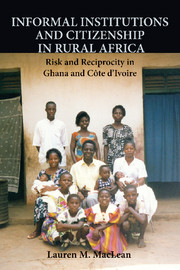 Informal Institutions and Citizenship in Rural Africa
Informal Institutions and Citizenship in Rural Africa Book contents
- Frontmatter
- Contents
- List of Tables and Figures
- List of Abbreviations
- Acknowledgments
- PART I THE TRANSFORMATION OF INFORMAL INSTITUTIONS OF SOCIAL RECIPROCITY IN GHANA AND CÔTE D'IVOIRE
- 1 Introduction
- 2 The Informal Institutions of Reciprocity: A Quantitative Puzzle and Analysis
- 3 Local Conflicts Over the Meaning of Reciprocity: A Qualitative Analysis of Change
- PART II LEGACIES OF THE STATE ROLE IN MEDIATING RISK IN GHANA AND CÔTE D'IVOIRE
- PART III INFORMAL INSTITUTIONS OF RECIPROCITY AND THE PROSPECTS FOR DEMOCRATIC CITIZENSHIP
- 8 Conclusion
- Appendix
- Bibliography
- Index
- Titles in the series
1 - Introduction
Published online by Cambridge University Press: 05 May 2010
- Frontmatter
- Contents
- List of Tables and Figures
- List of Abbreviations
- Acknowledgments
- PART I THE TRANSFORMATION OF INFORMAL INSTITUTIONS OF SOCIAL RECIPROCITY IN GHANA AND CÔTE D'IVOIRE
- 1 Introduction
- 2 The Informal Institutions of Reciprocity: A Quantitative Puzzle and Analysis
- 3 Local Conflicts Over the Meaning of Reciprocity: A Qualitative Analysis of Change
- PART II LEGACIES OF THE STATE ROLE IN MEDIATING RISK IN GHANA AND CÔTE D'IVOIRE
- PART III INFORMAL INSTITUTIONS OF RECIPROCITY AND THE PROSPECTS FOR DEMOCRATIC CITIZENSHIP
- 8 Conclusion
- Appendix
- Bibliography
- Index
- Titles in the series
Summary
African political economies are not always and everywhere in crisis. Indeed, over the past 100 years, the countries of Ghana and Côte d'Ivoire in West Africa have been considered successful models of democratic and economic development at different points. We cannot understand the varied paths of the Ghanaian and Ivoirian political economies by solely focusing at the macro level on state weakness, or by exclusively concentrating at the micro-level on the deficits of social capital or missing institutions. In this book, we travel to similar villages in the countryside on either side of the Ghana–Côte d'Ivoire border to see how the history of people's experience of state-building has fundamentally transformed economics and politics from the ground up.
A little more than 100 years ago, prior to European colonial rule, an outsider traveling to the four Akan villages selected for this study in the forest zone of West Africa would have found communities with very similar political histories, economies, social organization, and cultures. As the Asante Empire began to centralize and expand in the mid-seventeenth century in what is now Ghana, these Akan groups resisted incorporation. Instead, they chose to migrate farther westward of the Asante capital of Kumasi to what is now the southwestern part of Ghana and the southeastern part of Côte d'Ivoire. (SeeFigures 1.1 and 1.2.) The Akan peoples in these fieldsite villages thus shared similar village chieftancies, matrilineal family systems, and customary systems of land tenure, inheritance, and justice.
- Type
- Chapter
- Information
- Informal Institutions and Citizenship in Rural AfricaRisk and Reciprocity in Ghana and Côte d'Ivoire, pp. 3 - 39Publisher: Cambridge University PressPrint publication year: 2010
